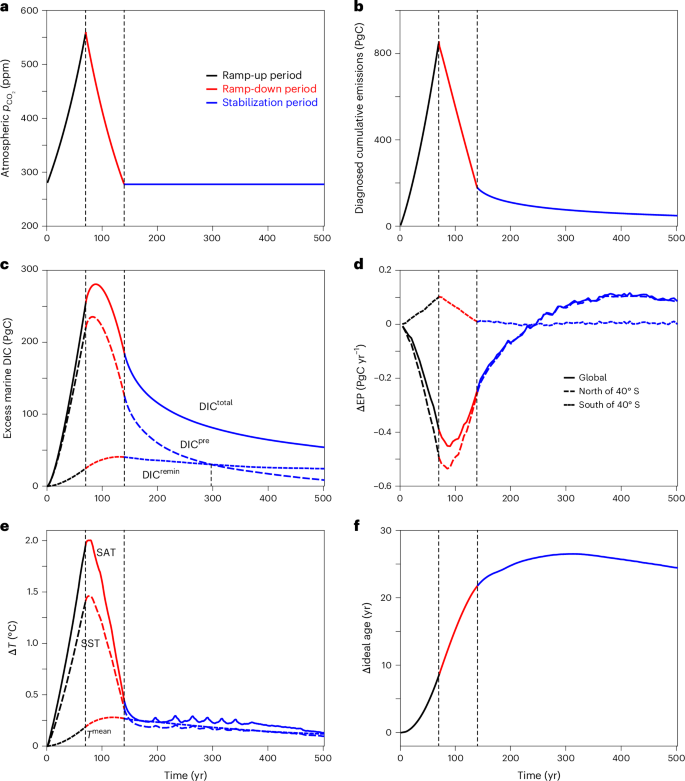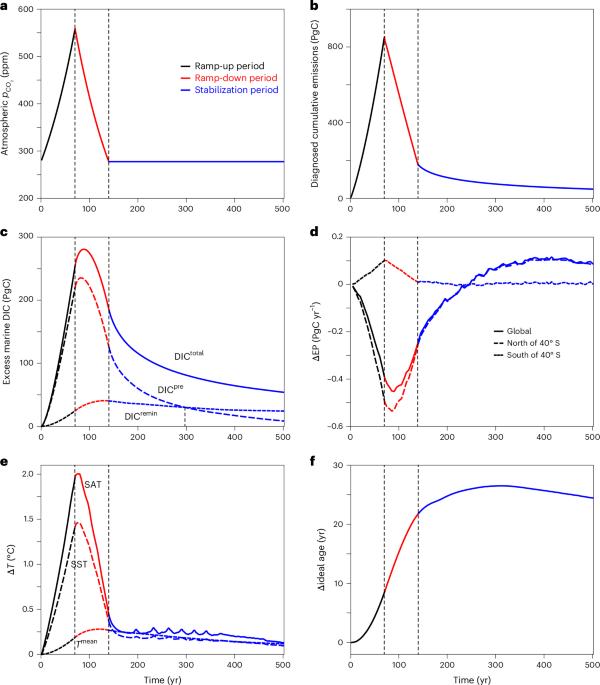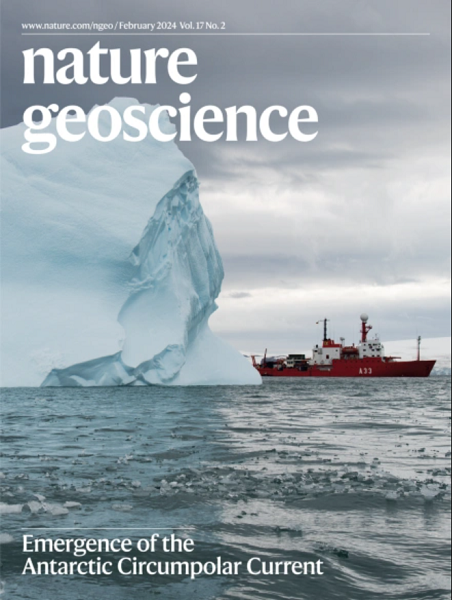温度超调后以生物泵为主的海洋碳汇
IF 15.7
1区 地球科学
Q1 GEOSCIENCES, MULTIDISCIPLINARY
引用次数: 0
摘要
如果减排努力不足,可能需要二氧化碳净负值排放,才能将气候变暖恢复到《巴黎协定》规定的可接受范围。在大气二氧化碳含量不断增加的情况下,当物理化学吸收碳占主导地位时,海洋是一个重要的碳汇。然而,二氧化碳净负值排放机制下的海洋碳汇过程尚不清楚。在这里,我们利用一个中等复杂程度的地球系统模型,以百年时间为尺度,评估了在一系列理想化的温度过高情景下海洋二氧化碳吸收和储存机制的变化。我们的研究表明,虽然物理化学吸收的二氧化碳的去向对未来大气边界条件非常敏感,而且在二氧化碳净负值排放时,二氧化碳会从海洋中部分流失,但与生物碳泵相关的储存却在继续增加,甚至可能在多百年时间尺度上主导海洋过量二氧化碳的储存。我们的研究结果表明,在量化和预测海洋碳汇的变化时,需要仔细考虑生物碳泵造成的过量碳。本文章由计算机程序翻译,如有差异,请以英文原文为准。


Marine carbon sink dominated by biological pump after temperature overshoot
In the event of insufficient mitigation efforts, net-negative CO2 emissions may be required to return climate warming to acceptable limits as defined by the Paris Agreement. The ocean acts as an important carbon sink under increasing atmospheric CO2 levels when the physico-chemical uptake of carbon dominates. However, the processes that govern the marine carbon sink under net-negative CO2 emission regimes are unclear. Here we assessed changes in marine CO2 uptake and storage mechanisms under a range of idealized temperature-overshoot scenarios using an Earth system model of intermediate complexity over centennial timescales. We show that while the fate of CO2 from physico-chemical uptake is very sensitive to future atmospheric boundary conditions and CO2 is partly lost from the ocean at times of net-negative CO2 emissions, storage associated with the biological carbon pump continues to increase and may even dominate marine excess CO2 storage on multi-centennial timescales. Our findings imply that excess carbon that is attributable to the biological carbon pump needs to be considered carefully when quantifying and projecting changes in the marine carbon sink. The biological pump may dominate ocean carbon uptake under net-negative CO2 emissions, according to Earth system model simulations of temperature-overshoot scenarios.
求助全文
通过发布文献求助,成功后即可免费获取论文全文。
去求助
来源期刊

Nature Geoscience
地学-地球科学综合
CiteScore
26.70
自引率
1.60%
发文量
187
审稿时长
3.3 months
期刊介绍:
Nature Geoscience is a monthly interdisciplinary journal that gathers top-tier research spanning Earth Sciences and related fields.
The journal covers all geoscience disciplines, including fieldwork, modeling, and theoretical studies.
Topics include atmospheric science, biogeochemistry, climate science, geobiology, geochemistry, geoinformatics, remote sensing, geology, geomagnetism, paleomagnetism, geomorphology, geophysics, glaciology, hydrology, limnology, mineralogy, oceanography, paleontology, paleoclimatology, paleoceanography, petrology, planetary science, seismology, space physics, tectonics, and volcanology.
Nature Geoscience upholds its commitment to publishing significant, high-quality Earth Sciences research through fair, rapid, and rigorous peer review, overseen by a team of full-time professional editors.
 求助内容:
求助内容: 应助结果提醒方式:
应助结果提醒方式:


